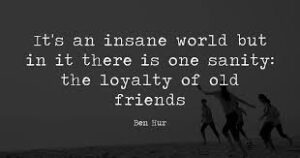Ravi Speaks:
A new study suggests that the quality of adult relationships matters more to our health than their quantity. Friends help our health go stronger as we age. Therefore, friends in our old age are even more important and their interaction and association really make one live a longer life avoiding the aloofness which is otherwise associated as we grow into the older stage. I am reproducing a very good article on it written and researched by Kira.M.Newman.Enjoy the read.
Friends Make One Live A Longer Life.
There came a moment in high school when I had all but lost hope of getting into college, and I turned to three friends: one close, one new, and an acquaintance—an eclectic triangle of support. But our relationships change as we age. These days, when stress hits, I’m more likely to pour my heart out one-on-one, to my partner or closest friend.

Psychologists know that social connection is good for our health: elderly people with lots of friends live longer, and social capital may protect us against heart attacks and cognitive decline, for example. But this new study provides a deeper understanding of the link between relationships and health, how it changes across the lifespan, and how that might impact our social choices.



But unlike the young and old, middle-aged adults who had had many social connections weren’t any healthier than their more isolated peers. Instead, what mattered for them was quality: Mid-lifers who had had the most social support were slightly less likely to be obese, while those with the most social strain suffered from more obesity and inflammation. Some of these links were present in younger and older adults, but not as consistently as in the middle-aged group.


Another paper published in March 2015 found a similar pattern: The number of relationships in one’s 20s and the quality in one’s 30s predicted higher well-being and less depression and anxiety decades later (although this study found no health effects). Its lead author, Cheryl Carmichael, believes that young people’s relationships help them learn social skills and figure out their place in the world—and here, presumably, more is better. According to Carmichael, busy 30-something with lots and lots of relationships might just be spreading themselves too thin.
She raises an important point: There’s only so much time in the day. Should we spend our precious moments forging new social connections or strengthening the ones we already have? The answer may depend on where we are in life’s journey—but at every age, connection matters.
